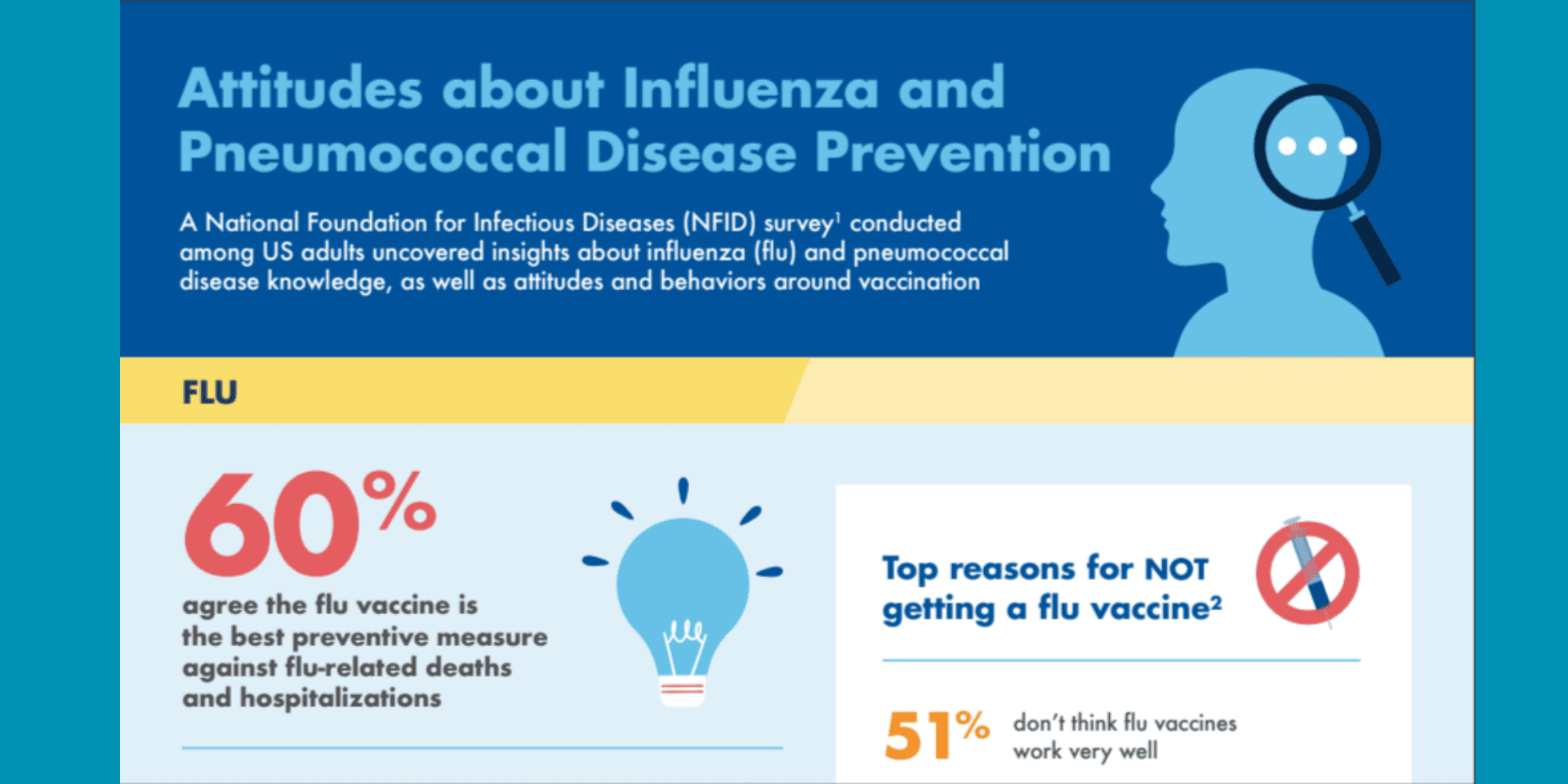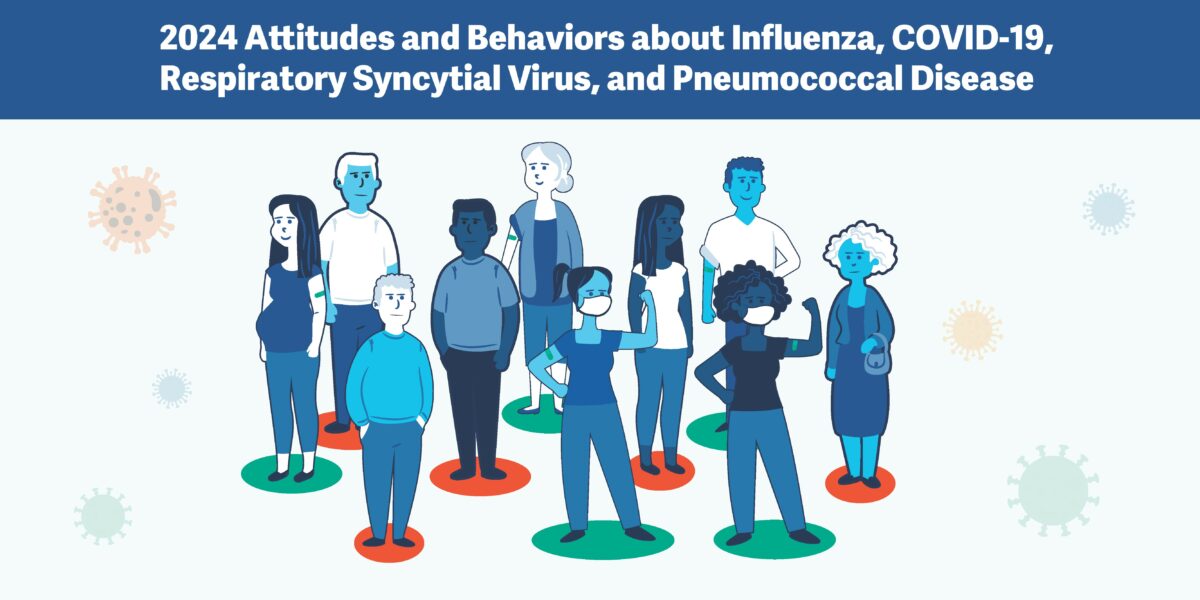
Influenza (flu) is a highly contagious viral infection that can cause mild to severe symptoms and life-threatening complications, including death, even in healthy children and adults. Pneumococcal disease is caused by bacteria and can cause various types of illness, including pneumonia, meningitis, ear and sinus infections, and sepsis.
Given that fewer than half of US adults typically receive an annual flu vaccination (despite the recommendation for everyone age 6 months and older to get vaccinated each year), the National Foundation for Infectious Disease (NFID) commissioned a survey to better understand beliefs about flu and pneumococcal disease, as well as attitudes and practices around vaccination. The survey included 1,002 complete responses—916 via the web and 86 via telephone—with US adults age 18 years and older representing the 50 states and the District of Columbia.
Summary of Key Results
Attitudes and Practices around Flu Vaccination
Overall, most US adults believe vaccination is the best protection against flu, but many do not plan to get vaccinated.
- 60 percent agreed that flu vaccination is the best preventive measure against flu-related deaths and hospitalization, but only 52 percent said they plan to get vaccinated against flu this season and 18 percent said they are not sure
- Top reasons cited for not getting a flu vaccine include:1
- 51 percent do not think flu vaccines work
- 34 percent are concerned with side effects from the vaccine
- 22 percent are concerned about getting flu from the vaccine
- One in four who are at higher risk2 for flu-related complications said they were not planning to get vaccinated this season
Sources of Information about Flu Vaccination
Healthcare professionals are the most trusted source of information about flu and vaccination. Social media is viewed with skepticism, and many are in favor of implementing reforms to prevent the spread of misinformation.
- The majority of US adults get information about flu vaccines from a healthcare professional, with more than six in 10 indicating this as their primary source of information
- Many have also used online platforms to learn more about flu vaccines. Fifty-five percent report using online platforms. Google and news articles were the most cited sources.
- Healthcare professionals are trusted for flu vaccine information far more than other sources. Seventy-one percent of US adults say they trust their doctor a great deal/a lot, and 61 percent trust their nurses a great deal/a lot.3
- 70 percent do not trust social media as a source of information about flu vaccines, and 60 percent agree that social media platforms should implement policies to reduce inaccurate information about flu vaccination
Access to Flu Vaccination
Among those who have received a flu vaccine, the majority report receiving their last vaccination in a healthcare setting. Even when vaccines are offered in the workplace, the majority of US adults reported they were not inclined to get vaccinated.
- 62 percent report receiving their last flu vaccine in a healthcare setting (e.g., doctor’s office, pharmacy, hospital, or health department)
- Only 8 percent of US adults reported receiving their last flu vaccination at their workplace, even though 40 percent of adults indicated that flu vaccines were available at their workplace
- A majority of US adults (63 percent) reported that they were not more likely to be vaccinated if their employer were to offer flu vaccines
Knowledge and Attitudes around Pneumococcal Disease
Among adults age 65 years and older, or those with an underlying health condition4 who are at increased risk for pneumococcal disease, there are gaps in awareness and understanding about pneumococcal disease and vaccination.
- Nearly half (46 percent) of individuals at higher risk2 were unfamiliar with pneumococcal disease
- Nearly 60 percent of individuals at higher risk report that they have never been advised to get vaccinated against pneumococcal disease
- Among the high-risk group of individuals, 32 percent report they have received a vaccine to prevent pneumococcal disease, 42 percent have not, and 25 percent are unsure of their vaccination status
- Among the high-risk individuals, 70 percent report that they are not planning on receiving a vaccine to prevent pneumococcal disease
- Top reasons for not getting pneumococcal vaccine include:1
- 42 percent are concerned with side effects from the vaccine
- 20 percent don’t like needles
- 12 percent don’t think pneumococcal vaccines work very well
Survey Findings
These survey findings highlight the importance of addressing misconceptions about flu and pneumococcal vaccine safety and effectiveness.
- Flu vaccine can vary in how well it works, but even in cases when flu vaccination does not prevent infection completely, it can reduce the severity and duration of disease and prevent serious complications.5
- For more than 50 years, hundreds of millions of individuals in the US have safely received seasonal flu vaccines.6
- Pneumococcal vaccines are safe and effective; most side effects are mild, such as arm swelling or soreness, and last one or two days.
The survey findings also underscore the need to educate populations at increased risk, including people with chronic health conditions such as lung disease, heart disease, and diabetes.
About the Survey
This NFID-sponsored survey was conducted by NORC at the University of Chicago. Data were collected using the AmeriSpeak Omnibus®, a monthly multi-client survey using NORC’s probability-based panel designed to be representative of the US household population.
Interviews for this survey were conducted between August 15 and 18, 2019 with panel members randomly drawn from AmeriSpeak. Interviews were conducted in English. The final stage completion rate is 20.0 percent, the weighted household panel response rate is 30.3 percent, and the weighted household panel retention rate is 85.4 percent, for a cumulative response rate of 5.2 percent. The overall margin of sampling error is +/- 4.3 percentage points at the 95 percent confidence level, including the design effect. The margin of sampling error may be higher for subgroups.
Once the sample has been selected and fielded, and all the study data have been collected and made final, a poststratification process is used to adjust for any survey nonresponse as well as any noncoverage or under and oversampling resulting from the study specific sample design. Poststratification variables included age, gender, census division, race/ethnicity, and education. Weighting variables were obtained from the 2018 Current Population Survey. The weighted data reflect the US population of adults age 18 and over.
About the National Foundation for Infectious Diseases
Founded in 1973, the National Foundation for Infectious Diseases (NFID) is a non-profit 501(c)(3) organization dedicated to educating the public and healthcare professionals about the burden, causes, prevention, diagnosis, and treatment of infectious diseases across the lifespan. Visit www.nfid.org for more information. For more information, visit www.nfid.org.
1 Top responses reflect survey respondent answers when asked to select “all that apply.”
2 People at higher risk for complications from the flu as defined in the survey include those age 65 years and older, smokers, and those with diabetes, asthma, heart disease, or kidney disease.
3 Responses reflect survey respondents ranking selections on scale of “trust a great deal/a lot,” “trust somewhat,” and “trust a little/not at all.”
4 Underlying conditions are defined in the survey as smoking, diabetes, asthma, heart disease, or kidney disease.
5 Misconceptions about Seasonal Flu and Flu Vaccines | CDC. Centers for Disease Control and Prevention. https://www.cdc.gov/flu/prevent/misconceptions.htm. Accessed July 10, 2019.
6 Centers for Disease Control and Prevention. Flu Vaccine Safety Information: Q&A. www.cdc.gov/flu/prevent/general.htm. Accessed August 15, 2019.
7 Centers for Disease Control and Prevention. Adults: Protect Yourself with Pneumococcal Vaccines. https://www.cdc.gov/features/adult-pneumococcal/. Accessed August 12, 2019; Centers for Disease Control and Prevention. Pneumococcal Vaccine Side Effects. https://www.cdc.gov/vaccinesafety/vaccines/pneumococcal-vaccine.html. Accessed August 29, 2019.
September 2019
Related Resources

Kaitlyn’s Story (Flu)
Kaitlyn was a student at the University of Florida in Gainesville when she nearly died from flu

What Is an Antiviral?
Overview of antivirals—what they are, how they work, and what diseases they help treat

2024 National Survey: Attitudes and Behaviors about Influenza, COVID-19, Respiratory Syncytial Virus, and Pneumococcal Disease
2024 national survey on flu, RSV, COVID-19, and pneumococcal disease
